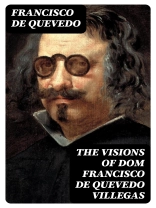In ‘The Visions of Dom Francisco de Quevedo Villegas, ‘ the renowned Spanish writer Francisco de Quevedo melds satirical prose with poetic flair, exploring themes of mortality, social critique, and the human condition through a series of vivid allegorical visions. This work exemplifies Quevedo’s baroque literary style, characterized by intricate wordplay and clever, often biting, humor. Set against the backdrop of the Spanish Golden Age, where literature flourished amidst rigorous social and political turmoil, Quevedo’s visions serve as both a reflection and critique of contemporary society, illustrating the moral decay and existential uncertainties faced during his time. Quevedo (1580-1645), a quintessential figure of Spanish literature, was influenced by his tumultuous experiences, including political intrigue and personal rivalries. His deep understanding of human nature, coupled with his sharp wit, enabled him to address profound philosophical questions and societal injustices. As a leading figure in the literary world, Quevedo navigated through the complexities of his era, often using satire to confront the issues of his lifetime, thereby laying the foundation for modern Spanish literature. Readers seeking a thought-provoking examination of life’s fundamental truths and societal shortcomings will find ‘The Visions of Dom Francisco de Quevedo Villegas’ to be an illuminating experience. Its intricate intertwining of humor and profundity invites both reflection and conversation, making it a valuable addition to the canon of classic literature.
Giới thiệu về tác giả
Francisco de Quevedo (1580–1645) was a towering figure of the Spanish Golden Age, a period that witnessed a flourishing of literature unmatched in Spain’s history. Quevedo was a nobleman, a man of sharp wit and sharper tongue, whose literary output is characterized by a satirical and hyperbolic style. A master of conceptismo, his work is marked by concise and pointed wit, as well as an abundance of rhetorical figures and devices. His opus includes poetry, prose, and political writings, but it is ‘The Visions of Dom Francisco de Quevedo Villegas’ that has enshrined his name among the great satirists of world literature. This work is a series of visions in which Quevedo offers a scathing critique of the society of his time, rendering moral corruption with an acerbic and fantastical tone. Quevedo’s prolific career spanned multiple genres, and his poetry alone traverses the sacred and the profane, highlighting his gravity and wit. His influence reaches deeply into Spanish literature, informing the work of subsequent writers and shaping the cultural landscape of the baroque period in Spain. Indeed, his legacy is palpable in the written word and in the very fabric of Spanish literary identity.












